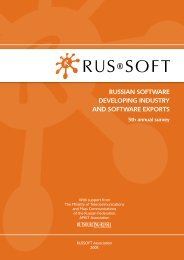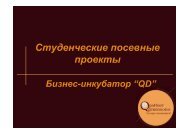russian software developing industry and software exports
russian software developing industry and software exports
russian software developing industry and software exports
You also want an ePaper? Increase the reach of your titles
YUMPU automatically turns print PDFs into web optimized ePapers that Google loves.
Chapter 6.<br />
Human Resources <strong>and</strong> the Labor Market Situation<br />
in it are worthy of attention since top rating positions<br />
are determined by real achievements.<br />
Brilliant results of students in international<br />
programming competitions prove that our<br />
universities can prepare top-class professionals. Such<br />
contests are regularly held by leading corporations to<br />
find talented programmers. Although champions <strong>and</strong><br />
winners of collegiate programming not always obtain<br />
equally outst<strong>and</strong>ing results in practical applications,<br />
as a rule they are able to fulfill the most complicated<br />
tasks at work.<br />
Many of Russian champions <strong>and</strong> winners of ACM<br />
Contest have set up successful <strong>software</strong> companies<br />
or are key specialists in such companies. Probably,<br />
they lack entrepreneurial skills <strong>and</strong> management<br />
20%<br />
15%<br />
10%<br />
5%<br />
0%<br />
Weighted average amount of university graduates<br />
in companies' staff, by turnover<br />
13%<br />
up to 0.5 MUSD<br />
16%<br />
19%<br />
from 0.5 MUSD<br />
to 4 MUSD<br />
15%<br />
from 4 MUSD<br />
to 20 MUSD<br />
6%<br />
5%<br />
over 20 MUSD<br />
Weighted average amount of university graduates in companies'<br />
staff, by the share of export revenue in gross earnings<br />
20%<br />
15%<br />
10%<br />
5%<br />
0%<br />
20%<br />
15%<br />
10%<br />
5%<br />
0%<br />
up to 50%<br />
over 51%<br />
Weighted average amount of university graduates<br />
in companies' staff, by companies' location<br />
4%<br />
Moscow<br />
19.2%<br />
St. Petersburg<br />
1%<br />
Novosibirsk<br />
12%<br />
Others<br />
experience for successful commercialization of their<br />
knowledge. With such knowledge their business<br />
achievements would be even more significant.<br />
Unfortunately, subst<strong>and</strong>ard infrastructure does not<br />
allow to advance <strong>software</strong> development for export in<br />
many of Russian cities that have opportunities to train<br />
big numbers of qualified specialists. Many talented<br />
graduates of provincial universities move abroad or<br />
to the major Russian cities (mainly to Moscow <strong>and</strong><br />
St. Petersburg), but not all are ready to leave their<br />
native towns.<br />
The victories of students reflect the general level<br />
of specialists training.<br />
It is unlikely that many graduates who failed to<br />
get into the world championship final are inferior<br />
to winners <strong>and</strong> champions. Sometimes it’s just the<br />
matter of luck or lack of a well-established system of<br />
preparation of students for such contests.<br />
The fact that since the last decade participants<br />
from Russia dominate international programming<br />
competitions confirms a very good quality of training<br />
of <strong>software</strong> developers in Russia, including those<br />
universities whose teams to not get into the finals.<br />
Over the past 10 years of participation in ACM<br />
championships the number of university teams from<br />
Russia that entered the world elite has grown. Since<br />
1999 10 Russian universities won prizes in these<br />
competitions, with 4 teams becoming absolute<br />
champions in different years. It is by far more than in<br />
any other country. In the last decade Russia won the<br />
champion title 6 times.<br />
In the final of the last team world programming<br />
championship among students held in Stockholm in<br />
April 2009 the absolute first place was again taken by<br />
Russians. For the second consecutive time the world<br />
champion became the team of St. Petersburg State<br />
University of Information technologies, Mechanics<br />
<strong>and</strong> Optics.<br />
Apart from universities, whose teams were the<br />
winners of the programming world championship as<br />
elite also may be classed Ural State University, South<br />
Ural State University, Stavropol State University, Orel<br />
State Technical University <strong>and</strong> Moscow Institute<br />
of Physics <strong>and</strong> Technology. Being among 30-40<br />
best universities based on results of the last final of<br />
the prestigious contest may also be considered an<br />
excellent achievement.<br />
Judging from the world championship results,<br />
high-class programmers can be trained in universities<br />
of 13 Russian cities: Moscow, St. Petersburg, Saratov,<br />
Perm, Izhevsk, Stavropol, Yekaterinburg, Novosibirsk,<br />
Ufa, Barnaul, Orel, Chelyabinsk <strong>and</strong> Petrozavodsk.<br />
About ten more Russian cities are equally good to<br />
compete with them.<br />
In individual contests on programming <strong>and</strong><br />
informatics Russian students <strong>and</strong> school children also<br />
perform very well. At the championship TopCoder<br />
Open 18 participants reached the semi-final 4 of them<br />
representing Russia. The semi-final <strong>and</strong> final rounds<br />
took part in Las-Vegas June 3-4, 2009.<br />
52








